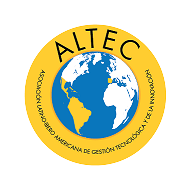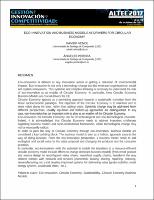| dc.contributor.author | Vence, Xavier | |
| dc.contributor.author | Pereira, Ángeles | |
| dc.date.accessioned | 2021-05-28T21:59:02Z | |
| dc.date.available | 2021-05-28T21:59:02Z | |
| dc.identifier.uri | https://hdl.handle.net/20.500.13048/1530 | |
| dc.description.abstract | Eco
-innovation is defined as any innovation aimed at getting a reduction of environmental
impacts. Eco
-innovation is not only a technology change but also embraces organisational, social
and system innovations. This systemic and complex thinking is necessary to understand the role
of eco-innovation as an enabler of Circular Economy. In particular, New Circular Economy
Business Models are crucial drivers for CE.
Circular Economy appears as a promising approach towards a sustainable transition from the
linear socioeconomic paradigm. The objective of the Circular Economy is to maintain and to
share value along the time, rather than adding value.
Systemic change may be addressed from
different perspectives, usually top-down and bottom-up approaches are distinguished. In any
case, eco-innovation has an important role to play as an enabler of the Circular Econo
my
.
Eco
-innovation for Circular Economy can be of technological and non-technological character.
Indeed, it is acknowledged that Circular Economy needs to address important challenges
regarding business models and socio-institutional frameworks, while technological change may
not be necessarily radical.
In order to pave the way to Circular Economy through eco-innovation, business models are
considered a key building block. The business model is seen as a holistic approach towards the
way of doing business. From the eco-innovation perspective, a business model needs to add
ecological and social value to the value proposal and changing the producer and the consumer
practices.
In particular, eco-innovations with the potential to enable the transition to a resource-efficient
circular economy model include efforts to change dominant business models (from novel product
and service design to reconfigured value chains, new/short supply chains), transform the way
citizens interact with products and services (ownership, leasing, sharing, repairing, reducing,
remanufacturing, etc.) and develop improved systems for delivering value (green mobility, smart
energy systems,
sustainable cities,
Etc.) | |
| dc.language.iso | eng | |
| dc.rights | info:eu-repo/semantics/openAccess | |
| dc.rights | Atribución-NoComercial-SinDerivadas 2.5 Perú | |
| dc.rights.uri | http://creativecommons.org/licenses/by-nc-nd/2.5/pe/ | |
| dc.subject | Ecoinnovación | |
| dc.subject | Economía circular | |
| dc.subject | Sustentabilidad | |
| dc.subject | Modelos de negocios de economía circular | |
| dc.title | Eco-innovation and business models as drivers for circular economy | |
| dc.type | info:eu-repo/semantics/conferenceObject | |
| dc.relation.conferencedate | 16-18 de octubre, 2017 | |
| dc.relation.conferencename | XVII Congreso Latino-Iberoamericano de Gestión Tecnológica | |
| dc.relation.conferenceplace | Ciudad de México, México | |
| dc.contributor.corporatename | Universidade de Santiago de Compostela | |


